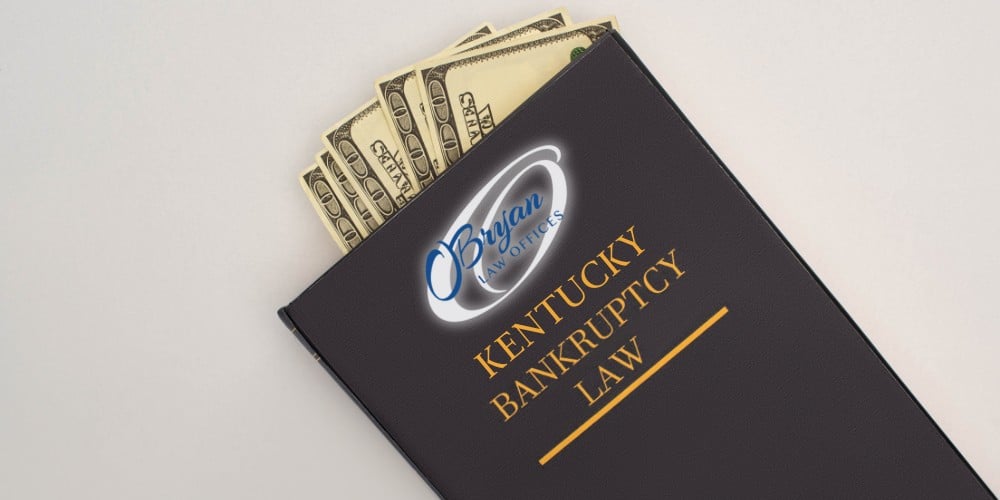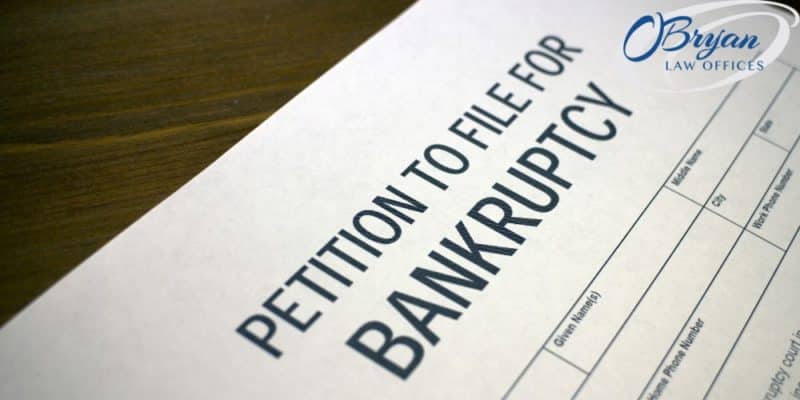Kentucky Bankruptcy Laws


If you’re facing bankruptcy in Kentucky, you may feel lost in terms of where to start or who to talk to. The bankruptcy process is often confusing and complicated for many people, which is why we recommend working with a Kentucky bankruptcy lawyer. Working with a bankruptcy attorney will ensure that you correctly fill out and file all necessary paperwork, meet important deadlines, and avoid certain bankruptcy mistakes. They will also be well-acquainted with both federal law and Kentucky law when it comes to filing bankruptcy.
At O’Bryan Law Offices, we strive to help as many Kentucky and Indiana residents as possible with their bankruptcy filings. We understand that the process may seem scary and overwhelming, especially if you’ve never dealt with financial hardships before. Our compassionate attorneys will guide you through the process of filing bankruptcy and be with you every step of the way. To schedule a free consultation with us, please call 502-339-0222 today.
What Are the Kentucky Bankruptcy Laws?
Each state, including Kentucky, has its own laws and regulations when it comes to bankruptcy filing. However, the overall processes aren’t very different from state to state. What tends to differ the most is what each state lists as its bankruptcy exemptions. Also, some states allow you to choose between state and federal exemptions, while others do not.
The Kentucky bankruptcy laws govern your exempt property, but federal law, specifically the Bankruptcy Code, governs the bankruptcy petition and process. Specifically, the Kentucky Revised Statutes outline the details of what we cover in the following sections.
Kentucky Bankruptcy Court Locations
It’s important to know where the bankruptcy court that will handle your case is located. First, you’ll need to determine whether you are in the Eastern District or the Western District of Kentucky.
The Eastern district oversees 22 counties in Kentucky, and has its main court location in Lexington. Five other locations in Ashland, Covington, Frankfort, London, and Pikeville also operate as divisional offices.
The Western district oversees 53 counties, and has its main court location in Louisville. Three other locations in Owensboro, Paducah, and Bowling Green act as divisional offices. To determine which district you will submit your bankruptcy filing in, contact an experienced attorney.
Kentucky Bankruptcy Forms
All the forms that the Bankruptcy Code and that Kentucky bankruptcy laws require filers to submit can be found on the website of the United States Courts system. Filers must fill out and submit all the necessary forms in a timely manner in order to receive their bankruptcy discharge. We recommend working with a local bankruptcy lawyer, as they will already know what documents you’ll need at the federal and local levels.
Working with an attorney will also help you immensely if you come across a question on any of the forms that you’re not sure how to answer. Our bankruptcy professionals have all the experience you need to make filing for bankruptcy go as smoothly as possible. You’ll likely need to fill out and submit at least 20 different forms throughout the process.
How to File Bankruptcy in KY
As we mentioned previously, Kentucky state law does not govern the process of filing bankruptcy in Kentucky. Rather, federal bankruptcy law determines how the process proceeds. However, Kentucky law does come into play with your bankruptcy exemptions. In order to begin the process, you must first determine whether you need to file Chapter 7 bankruptcy or Chapter 13 bankruptcy.
Chapter 7 Bankruptcy KY
Many people prefer Chapter 7 bankruptcy to Chapter 13, as it is faster and cheaper. Also known as liquidation bankruptcy, Chapter 7 allows debtors to discharge their debts without having to pay creditors back. However, the downside is that you could lose certain assets in the process. This is especially true if you own any items that are considered “unnecessary” or “luxury.”
Chapter 13 Bankruptcy KY
Those who do not qualify for Chapter 7 often file Chapter 13 instead. In this chapter, debtors must pay back at least a portion of their debt over a three to five-year period. They can also keep more of their personal property and avoid foreclosure on their home. However, this chapter is more expensive for obvious reasons.
KY Bankruptcy Means Test
To determine which chapter you qualify for, you’ll have to take a Kentucky bankruptcy means test. The means test will calculate your average monthly income and then determine whether you make too much money to file Chapter 7. The income limit for filing Chapter 7 also takes into consideration the number of people in your household.
Kentucky Bankruptcy Exemptions
Each state has different bankruptcy exemptions, and some states allow you to choose between state and federal exemptions. Keep in mind that only nonexempt assets may face liquidation in a Chapter 7 filing, regardless of the exemptions. Most people will be able to protect their essentials, such as their home, their car, and even tools of the trade.
Kentucky allows filers who have lived in the state for at least two years to choose between using Kentucky bankruptcy exemptions and federal exemptions. Below, we outline the Kentucky-specific exemptions as well as federal bankruptcy exemptions. Having an understanding of both sets is important for your bankruptcy case.
Real Property Exemptions
The Kentucky homestead exemption protects up to $5,000 in equity on your permanent residence. Compared to other states’ bankruptcy exemptions and federal exemptions, this is a fairly small amount of protected equity. To find out how much equity you have in your home, calculate your home’s current value. Let’s say your home is worth $200,000, and you still owe $150,000 on it. In this case, you have $50,000 in equity on your home, but the Kentucky bankruptcy exemptions would only protect $5,000 of that equity.
Personal Property Exemptions
Kentucky’s exemptions on personal property are also not as generous as other states. According to the Kentucky bankruptcy exemptions, the following forms of real or personal property are exempt.
- Up to $3,000 aggregate value in furniture and clothing
- Livestock, farm tools, and farm equipment worth up to $3,000
- All health aids that you have been prescribed by a doctor
- Up to $2,500 in the equity of one vehicle
Money Exemptions
You can also use Kentucky exemptions to protect other assets, such as wages, insurance benefits, and other intangible assets. Kentucky residents may be able to protect the following with state exemptions.
- Child support
- Group life insurance proceeds
- ERISA-qualified retirement accounts
- Alimony payments
- Disability benefits
- Personal injury awards
- Certain pensions
- Workers’ compensation
- Wrongful death awards
- Other money benefits
Other Kentucky Bankruptcy Exemptions
There are other types of exemptions when you file bankruptcy in Kentucky that don’t really fit in the above categories. We outline these other state exemptions below.
- “Tools of the trade” up to $300 for any occupation
- Up to $2,500 worth of equipment for skilled tradespeople
- Up to $1,000 worth of furnishings and professional equipment for work, as well as up to $2,500 and one spare tire if necessary for the business
- Wildcard exemption of up to $1,000
Federal Bankruptcy Exemptions
You may find that the federal bankruptcy exemptions protect more of your real and personal property than your state bankruptcy exemptions. The exemptions for filers listed in the Bankruptcy Code apply to single filers only. If you file jointly with your spouse, you can double the listed amounts.
One of the most significant reasons why many people choose the federal exemption option is for the more generous homestead exemption. The Kentucky homestead exemption only protects up to $5,000 of the equity in your home. Under the federal homestead exemption, however, one filer can exempt $27,900 of the equity in their home. However, if you file jointly with your spouse, this figure doubles to $55,800.
If you don’t own a home, or if you have a partially unused homestead exemption, you can use up to $13,950 of that as another wildcard exemption. As of April 2022, you can also receive a full federal exemption for the following.
- Alimony or child support
- Tax-exempt retirement accounts
- Life insurance proceeds
- Personal injury case awards
- Unmatured life insurance policy
- Disability benefits
- Social Security benefits
- Compensation for unemployment
- Health equipment and health aids prescribed by a doctor
- Other forms of federally-exempt property
How Much Does It Cost to File Bankruptcy in KY?
The answer to this question mostly depends on the chapter of bankruptcy that you file. To file Chapter 7 in Kentucky, you’ll need to pay $338 in filing fees. To file Chapter 13 in Kentucky, you’ll need to pay $313 in filing fees, on top of what you arranged for your payment plan. Many people qualify for fee waivers, however. Speak with a Louisville bankruptcy lawyer to find out if you qualify for fee waivers.
Can You File Bankruptcy and Keep Your House in Kentucky?
We understand that filing for bankruptcy has a certain negative association for most people. They imagine that their lives will fall apart if they file, or that they’ll automatically lose their home and their other property. However, bankruptcy is simply a legal tool that allows debtors to regain control of their finances. It also gives you the protection of the automatic stay, which is the only legal guarantee that your creditors will stop harassing you and that you can stop foreclosure proceedings.
Luckily, most bankruptcy filers are able to keep their homes when they file for bankruptcy. There are two situations in which filers may face the loss of their home after they declare bankruptcy.
- If you fail to make your mortgage payments on time, your mortgage lender can begin the foreclosure process against you. While filing for Chapter 7 will delay this process by a few months, they can still pursue the foreclosure once your bankruptcy case concludes.
- You could also lose your home if you have too much equity in the property. Chapter 7 filings only allow debtors to have a certain amount of equity in their home if they wish to keep it. If you have more equity than the allowable amount, your bankruptcy trustee can sell the house and use the equity to pay your creditors.
How Much Debt Do You Have to Have Before Declaring Bankruptcy?
Technically, there is no minimum debt requirement for a person to file bankruptcy. However, we always recommend exploring your options with a skilled attorney to make the best possible decision for your situation. Filing for bankruptcy helps countless debtors achieve debt relief every year, but it isn’t a one-size-fits-all solution.
We strongly recommend scheduling a free consultation with a Kentucky or Indiana bankruptcy lawyer before you decide to file. At O’Bryan Law Offices, we can help you examine the facts of your situation and determine whether or not bankruptcy is the right choice for you.
How Long Does It Take to File for Bankruptcy in Kentucky?
This depends on which chapter you file. Chapter 7 filings, from start to finish, usually take only a few months to complete. Chapter 13 filings, however, can take anywhere from three to five years in total. Consider the pros and cons of both chapters before you take the means test. Examining the benefits that each chapter provides for your situation is one important way of researching the process before you dive in head first.
Contact Our Kentucky Bankruptcy Attorneys Today
At O’Bryan Law Offices, we’ve seen Kentucky and Indiana residents encounter hardships for a number of reasons, including changes in the economy, sudden medical bills, and other unexpected costs. Filing bankruptcy may sound like the worst decision you could ever make, but our law firm helps to show consumers that it is actually a debt relief option. If you’re struggling with unmanageable debt, consider the legal protections that bankruptcy has to offer. To schedule your free consultation with us, please call our office at 502-339-0222 today.







